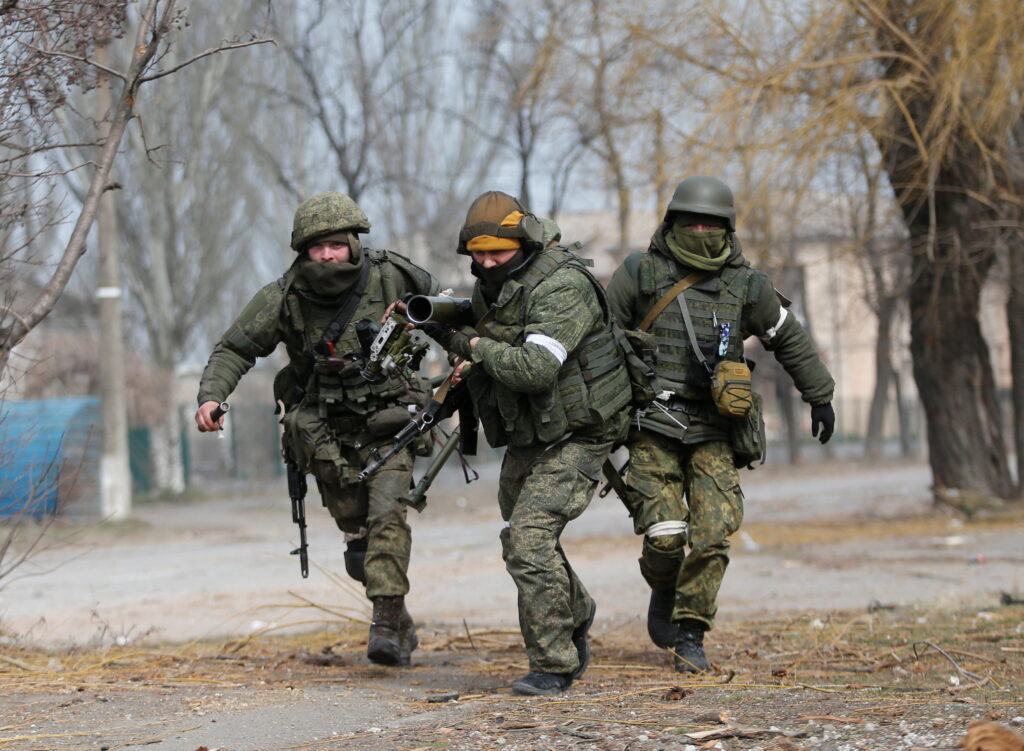 |
| Service members of pro-Russian troops in the besieged southern port city of Mariupol, Ukraine March 31, 2022. REUTERS/Alexander Ermochenko |
Russian gas was still flowing to Europe on Friday despite a deadline set by President Vladimir Putin to cut it off unless customers start paying in roubles, Moscow’s strongest threat to retaliate for sanctions imposed over its invasion of Ukraine.
Negotiations aimed at ending the war were set to resume by video link, with Ukrainian forces making more advances on the ground in a counterattack that has repelled the Russians from Kyiv and broken the sieges of some cities in the north and east.
After failing to capture a single major Ukrainian city in five weeks of war, Russia says it has shifted its focus to the southeast, where it has backed separatists since 2014.
The area includes the port of Mariupol, scene of the war’s worst humanitarian emergency, where the United Nations believes thousands of people have died after more than a month under Russian siege and relentless bombardment.
The Red Cross had hoped to begin evacuations from the city on Friday with the first aid convoy, but Ukraine said Russia had prevent buses from reaching it on Thursday.
Western sanctions imposed over the war have cut off Russia from much of world trade, but exceptions have been carved out for oil and gas.
Putin signed an order setting a Friday deadline for buyers from “unfriendly” countries to pay for gas using roubles or be cut off, a demand Western customers have rejected as an attempt to rewrite contracts that call for payment in euros. Germany, the biggest buyer, called it “blackmail”, and had warned this week of a potential emergency if supplies were curtailed.
But there was no sign on Friday of an immediate interruption. Flows remained steady through two of the three main pipelines bringing Russian gas into Europe – Nord Stream 1 across the Baltic Sea, and into Slovakia over Ukraine.
Flows through the other main route, the Yamal-Europe pipeline over Belarus, had reversed direction, now bringing gas from Germany to Poland, but this occurs occasionally and did not necessarily indicate a new policy.
Gazprom, Russia’s state-owned gas giant, said it was continuing to supply Europe via Ukraine in line with requests from consumers that were down only fractionally from Thursday.
A source had told Reuters that some contracts involved gas being delivered before payments were due, suggesting the taps might not be turned off immediately. Read full story
‘EVERLASTING FEAR’
Putin sent troops on Feb. 24 for what he calls a “special military operation” to demilitarise Ukraine.
Western countries call it an unprovoked war of aggression and say Putin’s real aim was to topple Ukraine’s government in a campaign that has so far failed, due to strong Ukrainian resistance and poor Russian logistics.
Irpin, a commuter suburb northwest of Kyiv that had been one of the main battlegrounds for weeks, was now firmly back in Ukrainian hands, a wasteland littered with burnt-out tanks.
Volunteers and emergency workers were carrying the dead on stretchers out of the rubble. About a dozen bodies were zipped up in black plastic body bags, lined up on a street and loaded into vans.
Lilia Ristich was sitting on a metal playground swing with her young son Artur. Most people had fled; they had stayed.
“We were afraid to leave because they were shooting all the time, from the very first day. It was horrible when our house was hit. It was horrible,” she said. She listed off neighbours who had been killed – the man “buried there, on the lawn”; the couple with their 12-year-old child, all burned alive.
“When our army came then I fully understood we had been liberated. It was happiness beyond imagination. I pray for all this to end and for them never to come back,” she said. “When you hold a child in your arms it is an everlasting fear.”
Over the past 10 days, Ukrainian forces have recaptured suburbs near Kyiv, broken the siege of Sumy in the east and driven back Russian forces advancing on Mykolaiv in the south.
In the latest Ukrainian advance, Britain’s Ministry of Defence said on Friday Ukrainian forces had recaptured villages linking Kyiv with the besieged northern city of Chernihiv.
At talks this week, Moscow said it would reduce offensives near Kyiv and Chernihiv to build trust at peace talks. Kyiv and its allies say Russia is pulling troops out in those areas, not as a goodwill gesture but to regroup, because they have taken heavy losses.
The Russians are still bombarding cities even as they pull out, and could be preparing a major new assault in the southeast, where they say they want to “liberate” the Donbas region claimed by the separatists, including Mariupol.
Ukraine’s general staff said Russian troops had started a partial withdrawal from the Kyiv region towards Belarus and were taking looted vehicles with them.
A fuel depot in the Russian city of Belgorod near the Ukraine border caught fire, and the regional governor said it had been hit by two Ukrainian helicopters in what would, if confirmed, be Ukraine’s first known airstrike on Russian soil. Ukraine’s defence ministry did not immideately respond to a request for comment. Russian oil firm Rosneft, which owns the depot, reported the fire without identifying the cause.
Ukrainian President Volodymyr Zelenskiy warned of “battles ahead” in Donbas and the besieged southern port city of Mariupol.
“We still need to go down a very difficult path to get everything we want,” Zelenskiy said.
